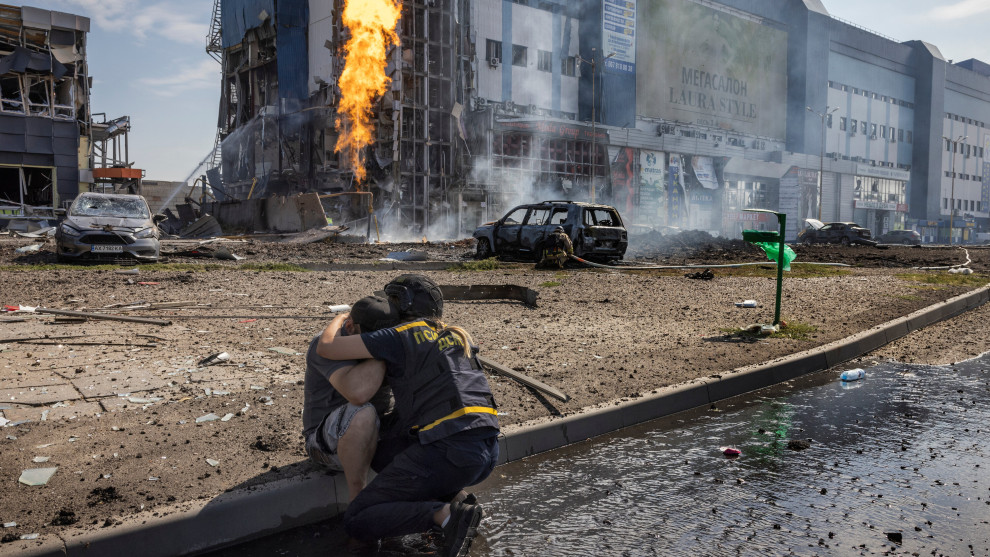At the NATO summit this week, President Donald Trump expressed a degree of puzzlement that the war between Ukraine and Russia is still going on, admitting that Russian President Vladimir Putin has been “difficult.”
“I’m surprised with him; I thought we would have that settled easy,” Trump said at a news conference Wednesday, adding that the Ukraine-Russia conflict has “been more difficult than other wars.”
That hope for a quick ending when Trump came on the scene had been shared by many Ukrainians, but the reality has sunk in that despite some U.S. efforts, the war could drag on for years and take Ukraine’s sputtering economy down with it.
For the moment, the economy is holding on — albeit with major Western support. But the risk, officials and analysts say, is that the financial aid will not be enough going forward. The only major investment plan on the horizon — the recently signed deal with the United States to develop Ukraine’s mineral wealth — is still years from development.
With Trump’s talk of a quick end to the war, businesspeople inside and outside the country had been poised to take advantage of the hoped-for peace dividend and reconstruction. Optimism in some quarters soared, with the price for Ukraine’s government bonds peaking in mid-February.
Those hopes have crashed as Trump’s attention has moved on to other conflicts — though he did promise Wednesday to call Putin and sort things out — and as Russian forces have redoubled their bombardment of Ukraine’s cities.
Among business leaders and Ukrainian officials, there has been a sharp reassessment.
“The ceasefire was at the heart of all economic forecasts, that it could come somewhere in mid-2025,” said a senior official in the presidential office who spoke on the condition of anonymity because he was not authorized to speak to reporters.
Now, he said, a “positive impact on the economy” this year “is no longer being considered,” though there are still hopes for 2026. Ukrainian officials now say the focus is on what needs to be done to stay afloat.
Last week, Ukrainian President Volodymyr Zelensky said he told the Group of Seven nations at a summit in Canada that it was “crucial” for Kyiv’s Western allies to provide Ukraine with $40 billion in annual budgetary support “to ensure our resilience and the ability of our country to carry on.”
Ukraine’s Western allies currently cover the country’s nonmilitary expenditures — such as pensions, health care and education — by garnishing interest payments from Russian assets abroad that have been frozen.
Next year, however, that support will cover only half of the $40 billion that Zelensky says the country needs, Ukrainian officials say.
Finance Minister Serhiy Marchenko told parliament this month that the country must be prepared for the war to continue to the end of 2026. Even if that is not the case, the government may have to cut billions from the state budget.
“These are serious figures,” Marchenko told lawmakers, according to local media reports.
Institutions like the International Monetary Fund, which has provided Ukraine with close to $16 billion since the beginning of the war, are also having to recalculate. Its last review said that “the baseline scenario continues to assume that the war winds down in the final months of this year.”
“If these assumptions are collapsing, then [the IMF has] a problem,” said Tymofiy Mylovanov, president of the Kyiv School of Economics. “The U.S. support is not there. European support is limited — it’s year-to-year, [and] the costs might increase. In these scenarios, there is no sustainability.”
But there is “very little that can be cut,” said Vitaliy Vavryshchuk, former head of the financial stability department at Ukraine’s National Bank. “We cannot cut … education or health care,” he said. “In 2025, the government did not increase minimum wages. The incomes of public-sector employees increased only marginally. There is very little or no room to cut expenditures in those segments.”
Most likely, Ukraine’s economy will “muddle through” at less than 3 percent growth this year and next, Vavryshchuk said. “Given all the factors together, the picture is not very encouraging.”
International and Ukrainian businesspeople in Kyiv said they had held out some hope for a Trump breakthrough but are now adapting to the circumstances. While few outside of key sectors are seeing profits, they also are not leaving the country.
Many have cut costs to the bone and reinvested their dividends into just maintaining their businesses in Ukraine.
“Investments that we are making and the big investments that we are planning to make are only outside of Ukraine,” a prominent Ukrainian businessman said, speaking on the condition of anonymity because of the sensitivity of the issue. “In Ukraine, we do only maintenance.”
“It’s my personal vision, and also in my company, that we will be living for another three years in this situation,” he said. “We build a business plan for one year, but we look at a maximum month-by-month.”
International organizations like the European Bank for Reconstruction and Development are providing funds for projects in Ukraine, but private investors are staying away, spooked by the security situation.
“We are not able to raise for these funds,” said a Western businessman working in Kyiv, who also spoke on the condition of anonymity because of the sensitivity of the situation. “We have had some discussions with private investors. But they are saying, ‘Okay, interesting. We would like to look at it and invest, but only after there is ceasefire.’”
The aftermath of a Russian missile strike in April that hit a community center in Sumy. (Ed Ram/For The Washington Post)
As Russia pounds Ukrainian cities and presses forward in the east, security and the war’s continuation is foremost in the minds of those working in Ukraine as well.
“The pace of retreat has huge impact on business confidence and readiness to do investments, so everybody obviously watches the daily reports about how many square kilometers we have lost,” the business man said. “Missiles and drone attacks damage your business, demotivate the population, force people to emigrate and impact services like electricity.”
There are bright spots. Ukraine’s banking sector has proved to be surprisingly resilient — the work of the country’s National Bank and the result of key reforms that were introduced before the war, officials and analysts say.
Renewable energy and biofuels are booming. And the country’s military production has skyrocketed, with Ukrainian officials now looking to export. Zelensky told journalists Friday that the country had raised some $43 billion for its defense industry — domestically and from abroad — and was now looking to start arms production lines in Europe.
Potentially, the biggest boost could come from a deal that Ukraine signed with the United States to develop the country’s oil, gas, minerals and other resources. After a months-long contentious negotiating process — which almost broke down because of a heated exchange between Zelensky and Trump in the Oval Office — Ukraine’s parliament ratified the agreement in May.
“This is truly a huge opportunity for Ukraine,” the senior official said. “No one perceives this agreement as imposed and unprofitable. We defended our interests at the negotiation stage.”
But the devil is in the details, some observers say. Two additional agreements — containing “all the technical details of Ukraine’s indefinite obligations” — have not been made public, Iryna Herashchenko, a deputy with the opposition European Solidarity party, wrote on Facebook days before the ratification.
Ultimately, the deal offers “huge opportunities,” said Vavryshchuk, the former National Bank official.
“It’s a work in progress,” he said. “We’re still at the point where we can go both ways. And it all depends on how the Ukrainian government, how the Ukraine authorities proceed.”






